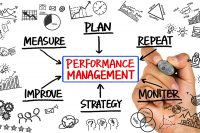Don’t Let Unreasonable Expectations Doom Your Workplace Like It Almost Did to WandaVision
It’s official. The Marvel Cinematic Universe (MCU) has successfully expanded to television. While Marvel has had previous forays into this medium (including Agents of S.H.I.E.L.D. and various shows on Netflix), WandaVision was Marvel’s first television show explicitly interconnected with the happenings of the MCU, which previously was only portrayed in feature films. And while the […]







